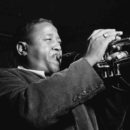Yesterday was the 102nd anniversary of the birth of Roy Eldridge. As he says up front in this BBC radio documentary, he was short and slight of build, and that earned him the nickname “Little Jazz,” but there was nothing diminutive about Roy’s trumpet playing or his stature in jazz history.

The documentary was produced by the BBC in 1976. In Part One, Roy discusses how important saxophone players Coleman Hawkins and Benny Carter were on his developing style, and of the time he saw Louis Armstrong at the Lafayette Theater in New York in 1932. Theretofore not terribly moved by Pops, in person he was blown away, or as Roy says of hearing Armstrong play “Chinatown, My Chinatown,” he “made me stand up.”
In Part Two, he’s heard with Fletcher Henderson’s Orchestra and on the great small group recordings he made with tenor saxophonist Chu Berry. Of Henderson’s Swing Era classic, “Christopher Columbus,” Roy says, “Part of that’s my tune, but I didn’t get no skin for it, no credit, no bread either.” Then he recalls the band he co-led in 1937 with his alto playing brother Joe at the Three Deuces in Chicago.
In Part Three, Roy’s recordings with Mildred Bailey and Billie Holiday are heard, and he discusses his 1939 radio broadcasts in New York in which the bill of fare was “tangoes, rhumbas, and Viennese waltzes. We could only play jazz on Sundays, and no one danced when we played jazz…But we went in for two weeks and stayed nine months.”
In Part Four, he reveals that when he recorded “Rockin’ Chair” with Gene Krupa in 1941, he was intoxicated and asked Krupa not to release the record. Six weeks later, Ben Webster invited him for breakfast and played him a 78 that at first he didn’t recognize, but when it got into the chorus he heard his sound and what unfolded was his “perfect” performance of the Hoagy Carmichael standard.
In Part Five, Little Jazz is heard playing “Undecided” with Oscar Peterson, Ray Brown, and Jo Jones, and concludes with he 1970 recording “Cotton,” which our BBC host says is a further example of how unfailingly modern Roy always managed to sound.